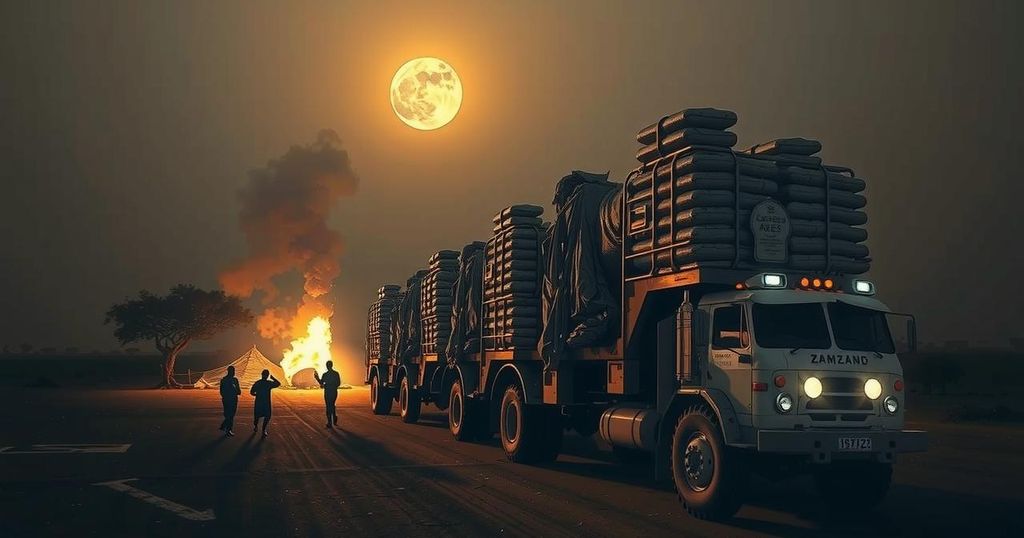First Aid Convoy Arrives at Famine-Hit Sudan’s Zamzam Camp After Months
The Zamzam camp in Sudan received its first aid convoy in months, delivering essential food supplies to approximately 500,000 displaced people suffering from famine conditions amid ongoing civil conflict. The delivery, organized by the UN’s World Food Programme, highlights the urgent need for humanitarian assistance as violence has impeded aid access for months. The conflict has displaced millions and created severe food shortages, necessitating continued international support.
A significant humanitarian development occurred as the Zamzam camp in Sudan, which accommodates approximately 500,000 displaced individuals, finally received its first aid convoy in months. The convoy, operated by the United Nations’ World Food Programme (WFP), arrived on a Friday due to previous interruptions in food deliveries caused by violent skirmishes in nearby el-Fasher and the difficult conditions of the rainy season. The ongoing civil war in Sudan has led to immense suffering, with millions displaced and communities driven to extreme hunger.
The population at Zamzam has surged since April, when fierce battles escalated between the army and the paramilitary Rapid Support Forces (RSF). As a result, the camp has been declared to be experiencing famine conditions, characterized by severe food shortages and alarming rates of malnutrition among children. The WFP has stepped up its efforts to deliver essential supplies, sending three convoys totaling over 700 trucks capable of feeding 1.5 million people for more than a month. This initiative aims to reach the most vulnerable populations across conflict-torn regions.
Furthermore, humanitarian corridors for aid delivery have faced significant challenges, with allegations against both warring factions regarding interference with aid operations. Nevertheless, measures have been taken to ensure continued access to these routes. The government recently agreed to keep a vital corridor open for further aid shipments. This response reflects a dire need for sustained international support to alleviate the suffering of those caught in this brutal conflict.
The article addresses the dire humanitarian crisis unfolding in Sudan, particularly in the Zamzam camp, which has become one of the most affected areas due to the ongoing civil war. Since 2021, Sudan has faced immense turmoil as a struggle for power between the Sudanese army and the RSF has resulted in widespread displacement and insecurity. With around ten million individuals forced from their homes, hunger and famine have become pervasive issues. Conditions for declaring famine are severely stringent, yet they have been met in Zamzam, highlighting the dire situation of those residing there. The UN and its agencies, such as the WFP, have been responding to the needs of these populations amid great logistical challenges.
In summary, Zamzam camp’s recent receipt of a much-awaited aid convoy represents a critical lifeline for the displaced individuals enduring famine conditions. The WFP’s efforts to ramp up food deliveries are essential to address the ongoing humanitarian crisis exacerbated by the conflict in Sudan. However, the protection of aid convoys and continued international support remain paramount for delivering assistance to all affected populations. The current situation demands urgent attention and sustained action to mitigate the catastrophic impact of the civil war on vulnerable communities.
Original Source: www.bbc.com




Post Comment